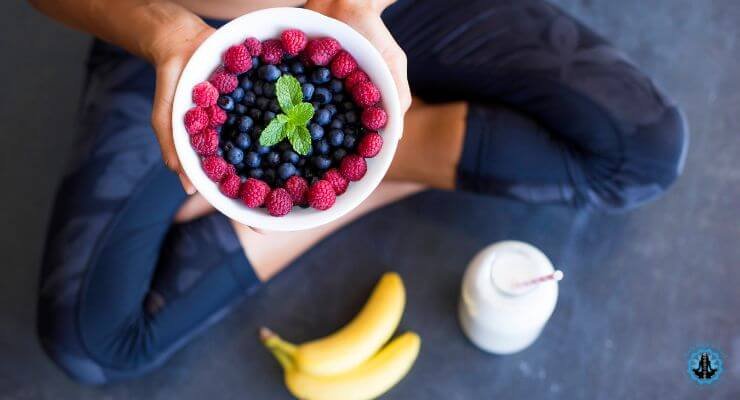Yoga has become a popular activity for people of all ages and backgrounds.
It offers a multitude of physical and mental benefits, including improved flexibility, strength, balance, and relaxation.
Whether you are a beginner or an experienced yogi, proper nutrition plays a crucial role in supporting your practice and enhancing your overall well-being.
In this article, we will explore the best foods to eat before and after yoga to fuel your body, maximize performance, and aid in post-workout recovery.
The Importance of Pre-Yoga Nutrition
Fueling your body with the right nutrients before a yoga session is vital for optimal performance and energy levels.
It is essential to choose foods that provide sustained energy, aid digestion, and prevent discomfort during your practice.
While it is not advisable to practice yoga on a full stomach, going to class on an empty stomach can leave you feeling weak and fatigued.
So, what should you eat before yoga?
Timing is Key
Allow yourself enough time to digest your pre-yoga meal or snack.
Ideally, aim to eat a light meal or snack about one to two hours before your yoga session.
This timeframe allows your body to digest the food properly, preventing any discomfort during your practice.
However, individual digestion times may vary, so it’s essential to listen to your body and adjust accordingly.
Balance is Key
When it comes to pre-yoga nutrition, balance is crucial.
You want to include a combination of macronutrients – proteins, carbohydrates, and fats – to provide sustained energy and support your muscles.
Let’s explore each macronutrient category and some suitable options:
Proteins
Including a source of protein in your pre-yoga meal or snack is essential for muscle repair and growth.
Opt for lean animal proteins such as chicken, turkey, or fish if you consume meat.
If you follow a vegetarian or vegan diet, choose plant-based protein sources like tofu, tempeh, legumes, or protein-rich grains like quinoa.
Carbohydrates
Carbohydrates are your body’s primary source of energy.
Choose complex carbohydrates that provide a steady release of energy, such as whole grains, fruits, and vegetables.
Avoid simple carbohydrates found in sugary snacks and processed foods, as they can cause energy spikes and crashes.
Fats
Healthy fats are important for satiety and provide a concentrated source of energy.
Incorporate sources of unsaturated fats like avocados, nuts, seeds, and olive oil into your pre-yoga meal or snack.
Hydration is Key
Staying hydrated before a yoga session is crucial for optimal performance and preventing dehydration.
Make sure to drink plenty of water throughout the day leading up to your practice.
If you practice hot yoga or anticipate sweating heavily, consider adding a pinch of sea salt to your water to replenish electrolytes.
Pre-Yoga Meal and Snack Ideas
Now that we understand the importance of pre-yoga nutrition and the macronutrients to include, let’s explore some specific meal and snack ideas:
- A whole grain wrap with lean protein, such as turkey or tofu, and a variety of colorful vegetables.
- Greek yogurt topped with fresh berries and a sprinkle of granola for added crunch.
- A small bowl of oatmeal topped with sliced banana and a drizzle of almond butter.
- A smoothie made with a combination of leafy greens, fruits, protein powder, and a source of healthy fat like almond butter or coconut oil.
- A handful of nuts and seeds with a piece of fruit.
- A hard-boiled egg with whole grain crackers or a slice of whole grain bread.
Remember to listen to your body and choose foods that you enjoy and that provide sustained energy without causing discomfort during your practice.
Nourishing Your Body After Yoga: Post-Practice Recovery
After a yoga session, your body needs proper nutrition to replenish energy stores, support muscle repair, and aid in recovery.
The foods you choose to eat after yoga should provide essential nutrients and promote a sense of nourishment and well-being.
Let’s dive into the key considerations for post-yoga nutrition.
Rehydrating and Replenishing Electrolytes
During a yoga session, you may have sweated out a significant amount of water and electrolytes.
It’s important to rehydrate and replenish these essential minerals to support proper bodily function.
Water is the most crucial element for hydration, but you can also consider other hydrating options like herbal teas, coconut water, or infused water with cucumber or lemon slices.
Protein for Muscle Repair and Recovery
Yoga, while low-impact, still engages and challenges your muscles. Consuming an adequate amount of protein after your practice is crucial for muscle repair and recovery.
Aim to include a source of high-quality protein in your post-yoga meal or snack.
If you consume animal products, lean meats like chicken or fish, Greek yogurt, or cottage cheese are excellent choices.
Plant-based options include tofu, tempeh, lentils, chickpeas, or a combination of grains and legumes to provide a complete protein source.
Carbohydrates for Energy Restoration
Refueling your body with carbohydrates after yoga helps replenish glycogen stores, which are the primary source of energy for your muscles.
Opt for complex carbohydrates like whole grains, sweet potatoes, quinoa, or fruits.
These provide a slow and steady release of energy, ensuring you feel replenished and rejuvenated after your practice.
Incorporating Nutrient-Dense Foods
Post-yoga nutrition should focus on nutrient-dense foods that provide a wide range of vitamins, minerals, and antioxidants.
Include a variety of colorful fruits and vegetables to maximize your intake of essential nutrients.
Dark leafy greens like spinach, kale, or Swiss chard are particularly beneficial due to their high nutrient content.
Post-Yoga Meal and Snack Ideas
To support your post-yoga recovery, here are some nourishing meal and snack ideas:
- Tofu with a side of roasted vegetables and quinoa.
- A colorful salad with mixed greens, cherry tomatoes, cucumbers, and your choice of protein like chickpeas.
- A bowl of vegetable stir-fry with brown rice or cauliflower rice.
- Greek yogurt topped with sliced almonds, chia seeds, and fresh berries.
- A smoothie bowl made with a combination of frozen fruits, spinach, almond milk, and your choice of toppings like granola, coconut flakes, and sliced banana.
Remember to listen to your body’s hunger and fullness cues and choose foods that leave you feeling nourished and satisfied.
Additional Tips for Optimal Yoga Nutrition
In addition to pre- and post-yoga nutrition, there are a few more tips to keep in mind to optimize your overall yoga practice:
Stay Hydrated Throughout the Day
Proper hydration is not just important before and after your yoga session but throughout the day.
Aim to drink at least eight glasses of water daily and adjust your intake based on your activity level and climate.
Mindful Eating
Practice mindful eating by paying attention to your body’s hunger and fullness cues.
Eat slowly and savor each bite, focusing on the flavors, textures, and nourishment your food provides.
Listen to Your Body
Every individual is unique, and what works for one person may not work for another.
Pay attention to how your body responds to different foods and adjust your nutrition accordingly.
Experiment with different pre- and post-yoga meals and snacks to find what makes you feel energized and satisfied.
Plan Ahead
To ensure you have nutritious options readily available, plan your meals and snacks in advance.
This will help you make healthier choices and avoid reaching for convenient but less nutritious options.
Consult a Registered Dietitian
If you have specific dietary needs, health concerns, or goals, consider consulting a registered dietitian.
They can provide personalized guidance and create a nutrition plan that aligns with your unique needs and supports your yoga practice.
Conclusion
Fueling your body properly before and after yoga is essential for optimal performance, energy levels, and post-workout recovery.
By choosing a balanced combination of macronutrients, staying hydrated, and incorporating nutrient-dense foods, you can support your body’s needs and enhance the benefits of your yoga practice.
Remember to listen to your body, experiment with different options, and nourish yourself both on and off the mat. Namaste!





